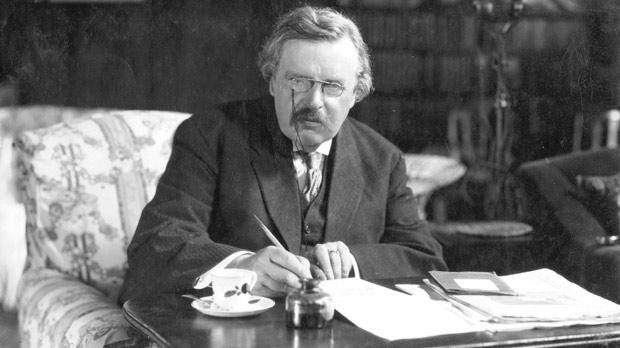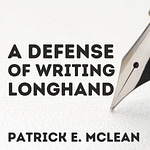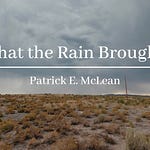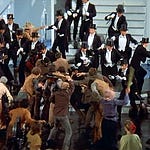
I hate being out-written. But I love reading highly skilled writers. Is this a form of self-abuse?
So this summer I’m reading G.K. Chesterton — and if that doesn’t sound exactly like beach reading, let me assure you, it’s ideal beach reading. He deals with big interesting ideas, in fiction as well as essays. And his essays/chapters are short and punchy, all ending with a tag like a great comic or classic copywriter might use. Or Shakespeare. He liked to end things on the button of a heroic couplet. Like
Good night, good night. Parting is such sweet sorrow
That I shall say good night till it be morrow.
So all I knew of Chesterton at the beginning of the summer was from reading the ‘Man Who Would Be Thursday’ which is a great little novel, and this gem of a quote, “The opposite of funny is not serious. It’s not funny and nothing else.“
Comedy, after all, is a very serious business. And the most sublime comics are the ones who can tell the truth in a way that makes it possible for us to bear it. Chesterton deals with the largest subject with the lightest of touches.
The man’s output was prodigious. He wrote 80 books, several hundred poems, some 200 short stories, 4000 essays, and several plays. He was a literary and social critic, historian, playwright, novelist, Catholic theologian.
His wikipedia entry says that he, “vigorously wielding paradox as a weapon against complacent acceptance of the conventional view of things.” And, so far I think that’s a pretty good summary.
Here’s an example. He wrote:
“Oscar Wilde said that sunsets were not valued because we could not pay for sunsets. But Oscar Wilde was wrong; we can pay for sunsets. We can pay for them by not being Oscar Wilde.”
And by that he did not mean by not being gay, but by not being a hedonist, a person who lives for no higher ideal. If I read Oscar Wilde’s “From the Depths” correctly (that’s the letter he wrote while being imprisoned for, in essence, flaunting his homosexuality) he repented his lack of an ideal. Or at least was harrowed by it.
I should also add, my adoration for Oscar Wilde as a master of the epigram knows no bounds. He’s another writer that just kicks everybody’s ass. When he was lying on his deathbed in cheap hotel room in Paris he looked said,
“This wallpaper is dreadful. One of us has to go.”
Also, for guy who died in 1936, a lot of Chesterton’s social comment still bites. For example:
“A man who says that no patriot should attack the Boer War until it is over is not worth answering intelligently; he is saying that no good son should warn his mother off a cliff until she has fallen over it.”
“The whole modern world has divided itself into Conservatives and Progressives. The business of Progressives is to go on making mistakes. The business of the Conservatives is to prevent the mistakes from being corrected.”
He was legendary frienimies with George Bernard Shaw. Who countered that by saying things like,
“A life spent making mistakes is not only more honorable, but more useful than a life spent doing nothing”
“People who say it cannot be done should not interrupt those who are doing it.”
They each paid each other the compliment of being a genius, but it seems that they were at each other over almost every other point.
Chesterton wrote a book about Shaw (He wrote 400 of them, he wrote a book about everything) the first line of which is “
MOST people either say that they agree with Bernard Shaw or that they do not understand him. I am the only person who understands him, and I do not agree with him.”
And he penned this epic takedown
After belabouring a great many people for a great many years for being unprogressive, Mr. Shaw has discovered, with characteristic sense, that it is very doubtful whether any existing human being with two legs can be progressive at all. Having come to doubt whether humanity can be combined with progress, most people, easily pleased, would have elected to abandon progress and remain with humanity. Mr. Shaw, not being easily pleased, decides to throw over humanity with all its limitations and go in for progress for its own sake. If man, as we know him, is incapable of the philosophy of progress, Mr. Shaw asks, not for a new kind of philosophy, but for a new kind of man. It is rather as if a nurse had tried a rather bitter food for some years on a baby, and on discovering that it was not suitable, should not throw away the food and ask for a new food, but throw the baby out of window, and ask for a new baby.
It’s so well done, so funny, that I don’t know how you can’t love it, even if you don’t agree with it. Which seems to be the stance they had towards one another.
Which Shaw would counter with something like this:
“The reasonable man adapts himself to the world; the unreasonable one persists to adapt the world to himself. Therefore all progress depends on the unreasonable man.”
Chesterton was a large man. During World War I, a woman in London asked him why he was not at the front. To which he responded, “Madame, if you go round to the side, you will see that I am.”
P.G. Wodehouse — another crushingly funny and brilliant writer (man, so much to read, so little time) once described a loud crash as “G.K. Chesterson falling into a sheet of tin.”
What’s with writers of the vintage and the two initials? P.G. Wodehouse G.K. Chesterson. E.B. White. I’m not even going to attempt P.E. McLean, for fear that the unsuspecting public will be fooled into thinking I’m a gym instructor.
Okay, so back to me getting my ass kicked by G.K. Chesterton. In my 4th of July podcast, I illustrated a point with a story. The point is, in the absence of an overarching ideal makes it really hard for a person to organize a life and a society to organize itself. This is hardly an original observation and comes down to what I think is in essence a religious problem.
So here’s my story:
We all live in a house. And one day somebody finds a leak in the roof. This is not good, people are getting wet! But instead of fixing the roof, or even putting a bucket under the leak — we tear the whole damn house down. Without having any place else to live.
Here’s G.K. Chesterton (I’m using the initials here like one might use a formal title out of respect) Here’s G.K. Chesterton on the same subject.
Suppose that a great commotion arises in the street about something, let us say a lamp-post, which many influential persons desire to pull down. A grey-clad monk, who is the spirit of the Middle Ages, is approached upon the matter, and begins to say, in the arid manner of the Schoolmen, “Let us first of all consider, my brethren, the value of Light. If Light be in itself good—” At this point he is somewhat excusably knocked down. All the people make a rush for the lamp-post, the lamp-post is down in ten minutes, and they go about congratulating each other on their unmediaeval practicality. But as things go on they do not work out so easily. Some people have pulled the lamp-post down because they wanted the electric light; some because they wanted old iron; some because they wanted darkness, because their deeds were evil. Some thought it not enough of a lamp-post, some too much; some acted because they wanted to smash municipal machinery; some because they wanted to smash something. And there is war in the night, no man knowing whom he strikes. So, gradually and inevitably, to-day, to-morrow, or the next day, there comes back the conviction that the monk was right after all, and that all depends on what is the philosophy of Light. Only what we might have discussed under the gas-lamp, we now must discuss in the dark.













Share this post